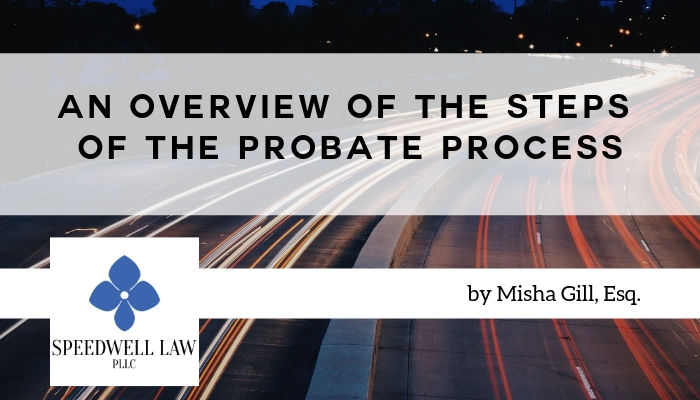
An Overview of the Steps of the Probate Process
The term “probate” refers to the legal process by which a deceased person’s estate is administered after their death, including the collection and distribution of assets and the payment of taxes and debts.
The probate process can vary widely from estate to estate. Some estates will have more non-probate assets, which can include assets the deceased owned in joint tenancy with another person, assets held in a living trust, or various types of beneficiary-designated assets, such as retirement plans, life insurance policies or payable-on-death accounts.
In addition, if the deceased did not have much in the way of valuable property, formal probate proceedings may not be necessary. Under Virginia law, heirs or the personal representative can file an affidavit with the court clerk to handle real estate. For other types of personal property, if the value of all assets left by the deceased is less than $50,000, all named beneficiaries can fill out and submit a simple affidavit.
Understanding standard probate
Beyond the aforementioned circumstances, it is important to have an understanding of the regular probate process. Here are the steps involved:
Appointment of executor
At the outset of the case, the person named to serve as executor must go to the appropriate circuit court with an original signed will, a certified copy of a death certificate and an estimated value of the assets of the estate. The executor will also need to provide a list of heirs, and in the absence of a self-proving will, one of the two witnesses who signed the will. Upon ratification of their status as executor, they can begin administering the estate according to the wishes of the deceased.
If no will exists or the named executor is unwilling to serve in the role, the probate court appoints an administrator, who, under Virginia law, can be anyone who inherits from the deceased.
If the executor or administrator is not a Virginia resident, he or she must also name a resident to serve as his or her agent. That person will be legally authorized to accept communications on behalf of the executor and will be under the supervision of Virginia courts.
Dealing with estate assets
Once the executor has clearance to begin administering the estate, he or she can begin collecting assets, having them appraised as needed, paying all debts and taxes out of the estate and then distributing the remaining assets in accordance with the will (or state law, in absence of a will). The executor will often open a bank account for the estate for easier management. The executor must file an inventory of estate assets, and develop annual accounting reports that include information about all estate assets and distributions.
Dealing with expenses
The executor is in charge of paying off all debts and expenses for which the estate is responsible. If the estate does not have enough money to pay off all debts, the executor must pay off debts in accordance with Virginia’s priority list. The highest priority debts, for example, are those for supporting a surviving spouse and minor children, after which come probate costs, funeral costs, taxes, medical bills and state debts.
Estate closure
The final step is closing the estate, which occurs after all expenses are paid off and all assets are distributed to beneficiaries. The court will relieve the executor of his or her responsibilities when it is satisfied he or she completed the job fully and satisfactorily.
Follow the Speedwell Blog HERE.
Schedule Your Consultation with Our Alexandria Estate Planning Attorney
Misha Gill is an Alexandria estate planning attorney for his firm, Speedwell Law, PLLC. If you would like assistance in setting up your own will, living trust, and other estate planning documents, Misha can be reached at (703) 553-2577 or [email protected].
This post, including any of its contents or links, is not intended to provide you with legal advice. It provides personal perspectives on legal news and developments. Reading this post, leaving a comment, or communicating with its author by email or over the Internet does not create any attorney-client relationship.





